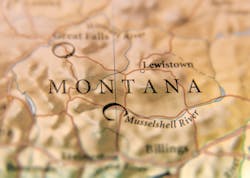The American Society of Clinical Oncology (ASCO) is launching a multi-year pilot program to increase access to high-quality, equitable cancer care in rural Montana.
The ASCO pilot program will enable patients to receive cancer care in their own community through a hub-and-spoke care delivery model, which ASCO says is a proven method of extending access to cancer care in rural and remote areas.
This initiative, which aligns with the Montana Cancer Coalition’s comprehensive cancer control strategy, aims to reduce patients' commute to treatment locations, enable rural sites to be primary points of contact, improve care delivery through education and training, and encourage patient engagement throughout the cancer care continuum.
The “Increasing Access to Cancer Care in Rural Montana” pilot program involves Bozeman Health Cancer Center, located at Bozeman Health Deaconess Hospital, a regional facility that serves as the initiative’s hub, and Barrett Hospital & HealthCare, a community-based nonprofit critical access hospital and medical clinic provider in Dillon that serves as the spoke. It will also enlist the assistance of the Mark and Robyn Jones College of Nursing at Montana State University, the only nursing graduate program in Montana, offering a potential pipeline to build a trained nursing workforce that can increase capacity and care delivery at participating community-based, or spoke, clinics.
“This innovative program addresses a very real problem in a concrete, tangible way. It takes advantage of resources and experts in the Montana cancer ecosystem while bringing cancer care closer to communities where patients live,” said ASCO President Eric P. Winer, M.D., in a statement. “We are thrilled to be working in Montana to inform care delivery models and strategies that can be used in other rural or under-resourced areas throughout the U.S. and beyond.”
Approximately 15 percent to 19 percent of the U.S. population lives in rural areas outside of major metropolitan centers, which is associated with worse cancer outcomes. Research has shown, for example, that cancer death rates are higher in rural versus urban areas—180 deaths per 100,000 versus 158 deaths per 100,000, respectively. Compared to those living in urban and suburban areas, patients with cancer in rural communities have higher rates of behavioral risk factors and are at increased risk to receive late-stage diagnoses and experience higher cancer-related death rates. Combined with limited access to screening and treatment, these factors contribute to health disparities.
Cancer is the second leading cause of death in Montana and, as one of the least densely populated states in the United States, almost half (45 percent) of the state’s residents live outside of incorporated cities and towns. More than three-quarters (76 percent) of individuals live in areas classified as rural and frontier. Further, Montana has a higher Native American population than other states and a considerably lower than national average median household income. These population and income disparities amplify the burdens associated with traveling long distances to access specialty care.
“One of the overall goals of the pilot program is to equip cancer care practitioners with specific solutions on how to deliver quality care to patients in historically underserved regions, as well as enable patients to receive the care they need at locations that are conveniently located,” said Jack Hensold, M.D., chair of the ASCO Rural Cancer Care Taskforce and Medical Director of Regional Outreach at Bozeman Health, in a statement. “This is about meeting patients where they are, which includes building trust with them, enlisting the support of community-based organizations, involving trusted community leaders, and building a collaboration network that enables all patients with cancer to be served.”
Rural and small community hospitals often do not have the capacity, infrastructure, or workforce to deliver on-site cancer care services, resulting in patients having to travel long distances to receive treatment. Through the consistent delivery of evidence-based healthcare, the pilot program’s overall goal is to improve cancer outcomes in rural communities through the delivery of care closer to where patients live. Additionally, it will enable patients to receive high-quality care that meets expected standards.
“This [program] is a tremendous first step in the prevention and treatment of cancer in rural communities. We are so pleased that patients in southwestern Montana will now have access to the same high-quality cancer care services and resources while maintaining the comfort and convenience of their local community,” said Carolyn Hansen, chief clinical officer at Barrett Hospital & HealthCare, in a statement.
Non-oncology professionals or individuals in health assistance roles will play a significant part in providing support, both during treatment and as individuals enter their survivorship phase. The hope is that effective coordination of care will also lead to improved health outcomes and reduced out-of-pocket costs associated with traveling long distances for ongoing specialty care.
The five-year pilot program will be regularly assessed, and project findings will be shared through publications, presentations, and other communications. Based on insights from the program, ASCO will develop a blueprint of best practices and resources that can support scaling the program to other areas.


